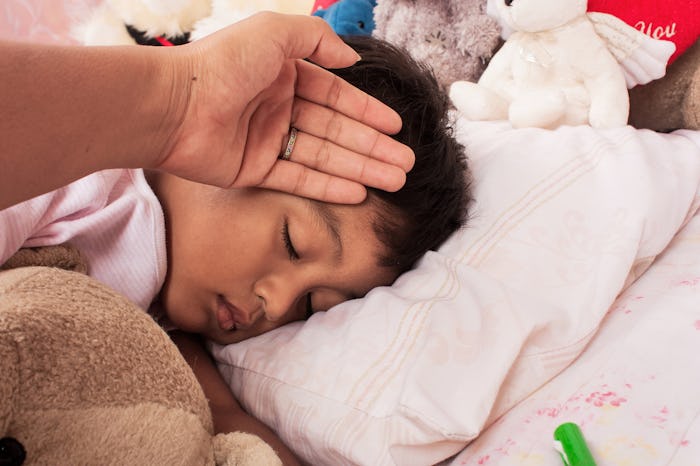Life

8 Signs Your Child Has A Stomach Bug So You Can Plan Accordingly
Almost every parent dreads their child coming down with the "stomach flu" — the catch-all name for a variety of conditions causing diarrhea, nausea, and vomiting. This condition is formally known as gastroenteritis and is actually not related to the influenza virus at all, but is, instead, caused by a variety of viruses, bacteria, or parasites. And while it's not all that fun to think about, you need to know the signs your child has a stomach bug so you can help them can get over it as soon as humanly possible.
For better or worse, and according to the American Academy of Family Physicians, if your child has gastroenteritis you will probably know it right away. Why? Well, because it generally causes a whole lot of diarrhea. According to the Cleveland Clinic, other signs of a stomach bug include vomiting and a loss of appetite. BabyCenter warns parents that gastroenteritis can cause dehydration too, which can be serious for babies and young children and result in hospitalization. So it's important to know what to look for and to frequently offer your child small amounts of fluids like water, an electrolyte replacement drink like pedialyte, or juice if they throw up or have diarrhea.
While gastroenteritis can be dangerous, if parents know what to look for they can generally manage their child's symptoms at home and let it run its course. Mayo Clinic does advise parents to call their child's doctor if they have symptoms of gastroenteritis with a fever higher than 102 degrees, seem unusually irritable or in pain, show signs of dehydration, have blood in their stool, or their vomiting lasts more than a few hours in babies.
Diarrhea
According to an article published in American Family Physician, the official diagnosis of gastroenteritis in kids usually involves a lot of diarrhea, defined as three or more watery or loose stools in a 24-hour period. While other conditions like food allergies can also cause diarrhea, the same site explains that a virus like Rotavirus is usually the culprit in up to 90 percent of cases, followed by bacterial infections and parasites... all of which are highly contagious.
Vomiting
Unfortunately for parents everywhere, another tell-tale sign of gastroenteritis, according to Mayo Clinic, is vomiting. And while your baby spitting up is no big deal, most of the time vomiting, especially vomiting that lasts for longer than a few hours, definitely is and requires a doctor's attention.
Fever
According to Mayo Clinic, stomach viruses and bacterial infections often present with a low-grade fever, which can be accompanied by irritability, body aches, and generally feeling unwell. So, if your child seems sick, and they also have other tummy troubles, they might just have a stomach bug. The same site notes that if your child's fever is higher than 102 degrees Fahrenheit, or they seem really uncomfortable or lethargic, it's definitely time to call the doctor.
Dehydration
The Cleveland Clinic notes that diarrhea and vomiting can lead to dehydration, which is super dangerous for kids and young children. Common symptoms of dehydration include dark urine, thirst, not having a normal amount of wet diapers, dry skin and lips, and eyes that appear sunken.
BabyCenter warns parents that dehydration can be extremely dangerous in young children, and always warrants a call to the doctor. In the meantime, you should try to offer your child small amounts of fluids like water, an electrolyte replacement drink like Pedialyte, or juice.
A Tummy Ache
The Mayo Clinic notes that gastroenteritis can cause abdominal pain and cramping, so if your child complains that their tummy hurts it might be a sign of a stomach bug, especially if accompanied by the dreaded diarrhea. The American Academy of Family Physicians notes that sometimes an early sign of your child's stomach bug might actually be abdominal tenderness when you touch them.
Sweating
According to the Cleveland Clinic, gastroenteritis can cause an excessive amount of sweating and clammy skin. Later dehydration might cause their sweating to stop, and their skin to become dry to the touch.
Poor Appetite
According to the Cleveland Clinic, poor feeding or a loss of appetite is a common symptom of gastroenteritis, especially in babies. While doctors used to recommend a special diet of bland foods like bananas and applesauce during a stomach bug, as BabyCenter reports, the American Academy of Pediatrics now recommends that you go ahead and give them their regular diet as soon as they want to eat something and can keep down solid food.
Weight Loss
An article published in American Family Physician notes that over time, gastroenteritis can lead to weight loss due to poor feeding, vomiting, and diarrhea. In young children, any unexplained or rapid weight loss, especially if it's accompanied by diarrhea, warrants a trip to the doctor.
This article was originally published on